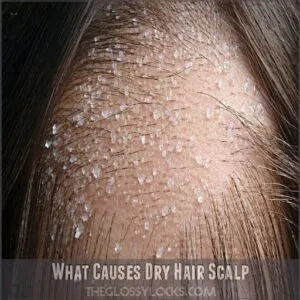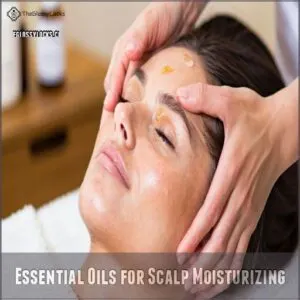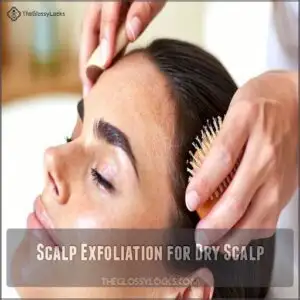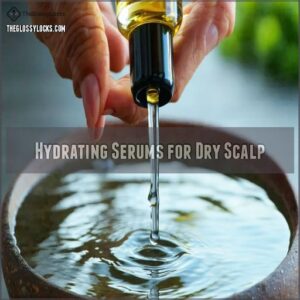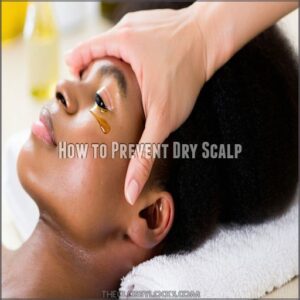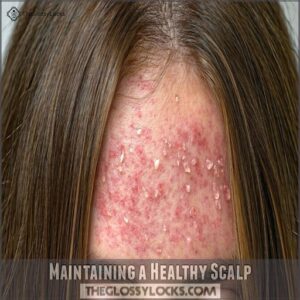This site is supported by our readers. We may earn a commission, at no cost to you, if you purchase through links.
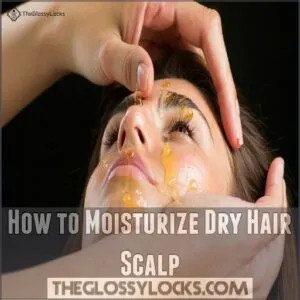
If your scalp resembles a desert due to dry air or harsh products, switch to a sulfate-free shampoo.
Add a moisturizing conditioner that feels like a rain shower for your scalp.
Consider scalp oils like jojoba or coconut, which are like a spa day in a bottle.
Exfoliating your scalp gently once a week can shed dry skin.
Use serums with hyaluronic acid for plump, happy skin.
And don’t forget, sometimes the answer lies in simplifying your routine.
Keep reading for more scalp-saving secrets!
Table Of Contents
- Key Takeaways
- What Causes Dry Hair Scalp
- How to Moisturize Dry Hair Scalp
- Best Shampoos for Dry Scalp
- Home Remedies for Dry Scalp
- Essential Oils for Scalp Moisturizing
- Scalp Exfoliation for Dry Scalp
- Hydrating Serums for Dry Scalp
- How to Prevent Dry Scalp
- When to See a Doctor for Dry Scalp
- Maintaining a Healthy Scalp
- Frequently Asked Questions (FAQs)
- How to moisturize dry hair?
- Can aloe vera help with a dry scalp?
- How do I moisturize my scalp & hair?
- How do you treat a dry scalp at home?
- What is a good moisturizer for a dry scalp?
- How should one properly moisturize an itchy scalp?
- How do you moisturize a severely dry scalp?
- What is good for hydrating the scalp?
- How do you add moisture to dry hair and scalp?
- How do you get rid of dry scalp on your head?
- How can diet impact scalp moisture levels?
- What role does stress play in scalp health?
- Are there specific vitamins for scalp hydration?
- How does weather affect dry scalp conditions?
- Can scalp dryness lead to hair loss?
- Conclusion
Key Takeaways
- Switch to sulfate-free shampoos and moisturizing conditioners to retain essential oils and prevent scalp dryness.
- Incorporate hydrating oils like jojoba or coconut into your routine with regular scalp massages to improve moisture levels and circulation.
- Explore home remedies such as aloe vera or honey masks to add extra moisture directly to your scalp.
- Reduce hair washing frequency to allow natural oils to nourish your scalp, and regularly clean your hairbrush by washing the hairbrush to prevent buildup and product residue from transferring to your hair, and avoid harsh haircare products that strip away moisture.
What Causes Dry Hair Scalp
When your scalp feels as dry as the Sahara, it’s likely due to factors like dry air, harsh haircare products, or skin conditions such as eczema and psoriasis.
Allergic reactions to certain shampoos or conditioners can also leave your scalp feeling itchy and parched, making it a true hair-raising issue.
Dry Air and Harsh Haircare Products
Winter hair woes? You might blame dry air or harsh products.
If your scalp’s as dry as week-old bread, here’s a fix:
- Switch to moisture-rich shampoos;
- Use conditioners free from sulfates;
- Limit hair washing to twice a week;
- Protect your hair from indoor heaters.
Keep your scalp health high on your hair routine list.
Skin Conditions Like Eczema and Psoriasis
Beyond dry air and harsh products, skin conditions like eczema and psoriasis can really dry out your scalp.
Eczema triggers, such as stress or certain fabrics, can worsen scalp irritation.
Similarly, psoriasis treatment often involves managing scalp symptoms.
A consistent scalp care routine is key; gentle cleansers and moisturizing products can make a world of difference.
Consider home remedies for eczema like aloe vera to soothe inflammation.
Remember, a dermatologist can help you develop a plan to manage these conditions and keep your scalp happy and healthy.
Allergic Reactions to Haircare Products
Eczema and psoriasis aren’t the only culprits.
Hair products can trigger allergic reactions too, leading to a dry, itchy scalp.
Common allergens in haircare products include fragrances and preservatives.
It’s wise to perform patch testing before trying new products.
If your scalp feels like it’s hosting a barbecue, consider swapping products to identify the pesky ingredient causing contact dermatitis.
How to Moisturize Dry Hair Scalp
To ease dry scalp woes, it’s time to embrace some hydrating habits.
Your scalp needs love just like your skin does, and a little attention can make a huge difference.
Here’s how you can nurture your scalp back to health:
- Scalp Massage: Give yourself a daily scalp massage with a soothing oil like jojoba or coconut. It promotes circulation and moisturizes. For best results, consider how often to oil your scalp, as dry or damaged hair may benefit from oiling once or twice a week check your scalp oiling frequency.
- DIY Remedies: Mix up a hydrating mask with ingredients like aloe vera or honey. These natural DIY remedies bring moisture straight to the roots.
- Scalp Treatments: Try pre-wash treatments rich in hyaluronic acid for an extra moisture boost. This helps lock in hydration while preventing hair loss.
Remember, consistent care leads to a happy, healthy scalp!
Best Shampoos for Dry Scalp
If you’re battling a dry scalp, choosing the right shampoo is like picking the perfect partner—it’s all about balance and harmony.
Sulfate-free options or those containing pyrithione zinc or ketoconazole help nourish your scalp without stripping it of essential oils.
Sulfate-Free Shampoos
Struggling with flakes and dryness?
Try sulfate-free shampoos.
They’re gentle and won’t strip your scalp of essential oils.
If you’ve got color-treated or sensitive skin, these are your best buddies.
Look for brands that highlight these benefits.
Avoid harsh ingredients like sulfates to keep your scalp happy and healthy.
Your hair will thank you by feeling fabulous!
Shampoos With Pyrithione Zinc
Pyrithione zinc shampoos can work wonders for dry scalp issues, like magic in a bottle.
They’re ideal for tackling the itchiness and flakes caused by dandruff.
Think about adding one to your routine to boost scalp health.
Look for:
- Balancing act: Gently reduces yeast on the scalp.
- Multi-tasker: Eases inflammation.
- Gentle touch: Suitable for regular use.
Ketoconazole Shampoos
In the battle against dry scalp, ketoconazole shampoos can be your secret weapon.
They target yeast growth, easing dandruff and irritation.
Use as directed for best results.
Check out the table below for more:
| Aspect | Details |
|---|---|
| Effectiveness | Targets dandruff |
| Usage Frequency | 2-3 times weekly |
| Possible Side Effects | Scalp irritation |
Consider alternatives if side effects occur.
Home Remedies for Dry Scalp
Let’s explore some easy, at-home solutions for that dry, itchy scalp!
Natural remedies like tea tree oil and aloe vera, backed by evidence, to help you find relief and get your scalp back on track.
Tea Tree Oil Treatment
Switching gears from shampoos, ever thought of tea tree oil‘s magic?
It’s not just for bug bites – this gem tackles dandruff too!
For a more targeted approach, explore tea tree oil scalp products here tea tree oil scalp.
Use a few drops with a carrier oil for a DIY mask.
Remember, tea tree oil’s strong, so dilute it well.
A little goes a long way, but beware of potential side effects like irritation.
Castor Oil and Aloe Vera Gel Mask
If tea tree oil didn’t tickle your fancy, consider a castor oil and aloe vera gel mask.
This DIY mask is a powerhouse for soothing dry scalp woes.
Blend one part castor oil with two parts aloe vera gel, and apply to your scalp regularly.
- Benefits: Moisturizes and relieves dryness.
- Application: Leave on for 30 minutes, then rinse.
- Frequency: Up to four times a week.
Apple Cider Vinegar Rinse
Tackling dry scalp? An apple cider vinegar rinse is your secret weapon.
This DIY recipe mixes 1 part vinegar with 2 parts water, helping to exfoliate and balance scalp pH.
It’s like giving your scalp a spa day!
But watch out for risks like irritation, and explore alternatives if needed.
| Benefits | Risks |
|---|---|
| Balances pH | Can irritate |
| Exfoliates | Smell |
| Antimicrobial | Dryness |
| Easy DIY | Sensitivity |
| Cost-effective | Allergies |
Essential Oils for Scalp Moisturizing
Essential oils like jojoba and coconut oil are great for nourishing a dry scalp, thanks to their rich moisturizing properties and soothing effects.
Essential oils like jojoba and coconut oil are great for nourishing a dry scalp, thanks to their rich moisturizing properties and soothing effects.
You might say they’re like a spa day for your scalp—minus the pesky swim cap!
Jojoba Oil and Coconut Oil Benefits
Jojoba oil and coconut oil are scalp-savior essentials in your natural hair care arsenal.
Jojoba oil mimics your skin’s natural oils, making it perfect for a balanced scalp oiling routine.
You can find a range of products that harness the power of jojoba oil for hair at Jojoba oil for hair care.
Oat water, a gentle hair cleanser, can also be used as a pre-poo treatment to moisturize dry hair scalp with oat water. Coconut oil dives deep to moisturize and foster hair growth.
Try them in DIY scalp masks to see these workhorses in action:
- Moisturizes deeply
- Promotes healthy scalp
- Supports hair growth
Olive Oil and Baking Soda Mask
Sometimes, your scalp just needs a little TLC, and that’s where the olive oil and baking soda mask steps in.
Think of it as a spa day for your head.
Olive oil hydrates, while baking soda gently exfoliates, making it a perfect duo for a DIY mask.
It’s quick, simple, and gives your scalp the freedom to breathe.
Scalp Exfoliation for Dry Scalp
Regular scalp exfoliation can remove dead skin cells and product buildup, improving your scalp’s health and allowing moisturizers to penetrate better.
Think of it as a facial for your head—gentle scrubbing helps your scalp breathe and thrive!
Scalp Scrubs and Massage Brushes
Want healthier hair? Let’s talk exfoliating your scalp. Swap oils for scrubs and brushes to slough off flakes.
Incorporating a regular scalp massage, which can stimulate hair growth, as shown by various scalp massage techniques, stimulating hair growth.
Here’s how:
- Choose a scrub: DIY options like sugar and coconut oil are great.
- Try massage brushes: Boost circulation with gentle, circular motions.
- Benefits: Enhances product absorption, leaving you feeling fresh, like a mini spa visit.
How Often to Exfoliate The Scalp
Nailing down how often to exfoliate your scalp is key to comfort and health.
Aim for once a week to shed those dead cells, but if you’re dealing with sensitivity, dial it down.
Exfoliating tools and DIY scrubs can be your secret weapon, offering benefits like improved product absorption.
Find your balance between too little and too much like Goldilocks.
| Frequency | Scalp Sensitivity | Exfoliation Tool |
|---|---|---|
| Weekly | Low | Brush |
| Bi-weekly | Medium | Scrub |
| Monthly | High | Mild Scrub |
| Twice a Week | Low | Scalp Brush |
| Rarely | High | Gentle Scrub |
Hydrating Serums for Dry Scalp
When your scalp feels as dry as the Sahara, hydrating serums can be your oasis, packed with ingredients like hyaluronic acid that retain moisture.
Try these serums for a simple way to bring life back to your scalp; they’ll make your hair happy, even when your skin’s feeling flaky!
Hyaluronic Acid and Natural Moisturizing Factors
You’ve exfoliated, now let’s hydrate! Hyaluronic Acid combined with Natural Moisturizing Factors (NMF) is your dream team for scalp hydration.
Packed with goodies like:
- Hyaluronic Acid Benefits: Deep moisture retention.
- NMF Ingredients: Boost natural moisture.
- Product Recommendations: Opt for serums packed with these.
- DIY NMF Mask: Mix your favorites for a spa-like treat at home.
Stay quenched!
Rosemary Pre-Wash Oil and Scalp Revival
Imagine a relaxing pre-wash oil routine with rosemary oil benefits, which is a key ingredient in many effective hair growth oil recipes.
It’s like a spa day for your scalp, promoting scalp revival with soothing scents and nourishment.
To make your DIY scalp oil blend, combine a few drops of rosemary oil with carrier oil.
Enjoy a scalp massage using gentle techniques; it relieves stress but it also powers up your scalp revival!
How to Prevent Dry Scalp
To prevent dry scalp, try washing your hair less frequently to allow natural oils to nourish your skin.
Harsh haircare products can strip essential moisture and lead to irritation.
Reducing Hair Washing Frequency
So, you’ve tackled hydrating serums? Great! Now let’s talk about your wash schedule.
Over-washing strips your scalp of its natural oils, leading to dryness.
Aim for a less frequent wash:
- To maintain healthy fine hair, a gentle cleansing routine is essential, including the use of volumizing shampoos to add body and cleanse gently. Fine hair: Every other day.
- Normal hair: Every 2-3 days.
- Thick hair: Every 3-4 days.
- Curly hair: Every 4-7 days (or even longer!).
Listen to your scalp—it’ll tell you what it needs.
This simple change can make a big difference.
Avoiding Harsh Haircare Products
Cut down on washes, but when you do, reach for sulfate-free shampoos that can help manage dandruff vs dry scalp.
These gentle heroes keep your scalp’s natural oils intact.
Stay aware of ingredients, dodging those long chemical names. Swap harsh detergents for natural haircare products.
Test before you invest; your scalp’s not the place for reckless experiments.
Healthy scalp, happy hair—it’s that simple!
When to See a Doctor for Dry Scalp
If you’ve tried using natural remedies for dry scalp like coconut oil, tea tree oil, or aloe vera, but your dry scalp persists, and it doesn’t improve with home remedies or over-the-counter products, it’s time for a dermatologist’s advice.
They’ll help determine if an underlying skin condition, like eczema, is causing the issue, ensuring you get the right treatment before your scalp decides to throw a "flaky" party.
Consulting a Dermatologist
You’re juggling different haircare routines, yet that pesky dry scalp persists.
Time to consult a dermatologist!
They’ll assess the root cause of your dry scalp, which could be related to conditions like folliculitis on the scalp, and then dive deep, offering a personalized dry scalp diagnosis and effective treatment options.
Whether it’s a referral for scalp treatments or pinpointing underlying conditions, their expertise ensures you’re on the right track.
Seeking professional help can make a world of difference.
Signs of Underlying Skin Conditions
Noticing redness, itching, or flaking on your scalp? It might feel like a pesky roommate that won’t leave, and at times, these signs hint at skin conditions needing more than TLC.
Consider exploring medicated scalp treatment options, such as those available at medicated scalp treatment.
Bumps or unexplained hair loss could be your scalp’s SOS.
Don’t wait—consult a dermatologist if these symptoms persist.
Remember, your scalp just wants a bit of peace too!
Maintaining a Healthy Scalp
Achieving a well-moisturized scalp starts with regular scalp oiling, which provides necessary hydration to prevent dryness and irritation.
Scalp oiling provides necessary hydration to prevent dryness and irritation.
You might also consider pampering sessions at a head spa, where treatments specifically focus on maintaining your scalp’s health.
Scalp Oiling and Targeted Treatments
After considering professional advice, try scalp oiling to boost moisture.
Choose scalp oil types like jojoba or coconut, and discover the ideal oiling frequency for you—perhaps weekly.
Targeted treatments help as well.
Mix DIY oil blends for a relaxing scalp massage.
This routine nourishes your scalp but also offers a moment of tranquility amidst life’s hustle.
Visiting a Head Spa for Scalp Care
Want a truly pampered scalp? Head spa treatments offer a luxurious way to boost scalp health.
These specialized sessions often include a deep cleansing process that can help balance oil production and reduce scalp acne, which are common benefits of a scalp detox treatment at home, which can be customized to address specific scalp concerns, such as product buildup or dryness.
A relaxing scalp massage, promoting hair growth and stress relief.
Hydrating treatments to combat dryness.
Personalized product recommendations for ongoing scalp care.
Investing in head spa visits can greatly improve your hair and overall well-being.
Frequently Asked Questions (FAQs)
How to moisturize dry hair?
Did you know that over 50% of adults experience dry scalp issues?
Moisturize your hair by using sulfate-free shampoos, applying coconut oil or aloe vera, and massaging your scalp regularly to enhance moisture retention and overall health.
Can aloe vera help with a dry scalp?
Aloe vera can soothe a dry scalp with its moisturizing and anti-inflammatory properties.
Aloe vera can soothe a dry scalp with its moisturizing and anti-inflammatory properties.
Just apply pure aloe gel directly, leave it for 10 minutes, then wash it off.
It’s like a relaxing spa day for your scalp!
How do I moisturize my scalp & hair?
Imagine turning a dry desert into an oasis.
Moisturize your scalp and hair, try massaging coconut oil weekly, skip harsh shampoos, and opt for a hydrating conditioner.
Keep your scalp happy and hydrated!
How do you treat a dry scalp at home?
Combat a dry scalp with a blend of nourishing oils like jojoba or coconut.
Apply these with tea tree oil to your scalp, let it sit for 15 minutes, then rinse.
Repeat weekly for best results.
What is a good moisturizer for a dry scalp?
Soothe your parched scalp with a gentle touch.
Consider jojoba or coconut oil; they’re natural moisturizers.
For extra hydration, try aloe vera gel or a scalp serum.
Remember a patch test first!
How should one properly moisturize an itchy scalp?
Apply a scalp serum or oil with moisturizing ingredients like jojoba or coconut oil.
Massage gently and let it sit for 10-20 minutes.
This boosts hydration and soothes the itchiness.
Remember, consistency is key for lasting relief.
How do you moisturize a severely dry scalp?
Imagine your scalp as a thirsty desert craving rain.
Hydrate it by massaging jojoba or coconut oil weekly, and choose sulfate-free shampoos.
Incorporate aloe vera for soothing relief, promoting moisture retention and overall scalp health.
What is good for hydrating the scalp?
Moisturize your scalp effectively with jojoba or tea tree oil, both known for their hydrating and antifungal properties.
Try adding a few drops to your shampoo or massage directly for a soothing, invigorating experience.
How do you add moisture to dry hair and scalp?
Balancing between dryness and hydration, try using jojoba or coconut oil directly on your scalp for nourishing moisture.
Massage gently, then rinse.
For extra care, consider a shampoo with pyrithione zinc to combat dryness effectively.
How do you get rid of dry scalp on your head?
Try using a gentle shampoo without sulfates and add jojoba oil or aloe vera to soothe your scalp.
Exfoliate weekly with a scalp scrub and avoid overwashing.
If issues persist, consult a dermatologist.
How can diet impact scalp moisture levels?
Picture your scalp like a thirsty plant in a parched desert; it craves nutrients.
A balanced diet rich in omega-3s, zinc, and vitamins A and E quenches this thirst, promoting natural oil production and healthier moisture levels.
What role does stress play in scalp health?
Stress can wreak havoc on your scalp!
High stress levels often trigger inflammation, disrupting your scalp’s natural balance and potentially leading to dryness, irritation, or even hair loss.
Managing stress is key to a healthy scalp.
Are there specific vitamins for scalp hydration?
Vitamins like biotin, vitamin E, and omega-3 fatty acids can enhance scalp hydration.
They promote healthy skin oil production and improve overall scalp health,
making your hair feel nourished from root to tip.
How does weather affect dry scalp conditions?
When winter blasts in, it steals moisture from your scalp, leaving it craving hydration.
Cold air dries quickly, while indoor heating lacks humidity.
You’ll feel the itch, so moisturizing is essential to keep things balanced.
Can scalp dryness lead to hair loss?
Yes, scalp dryness might lead to hair loss due to inflammation and irritation weakening hair follicles.
Keeping your scalp moisturized is essential to avoid these issues, so consider adopting a consistent scalp-care routine with hydrating products.
Conclusion
Did you know that nearly 60% of people experience scalp dryness at some point in their lives?
Combatting a dry hair scalp doesn’t have to be overwhelming.
By understanding the causes and options, like switching to a sulfate-free shampoo or using scalp oils, you can transform your routine into a soothing ritual.
From home remedies to essential oils, these methods offer relief and nourishment.
Remember, sometimes the simplest tweaks make the biggest impact on your scalp health.

